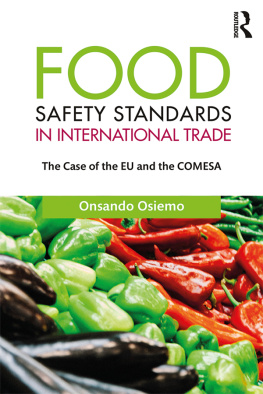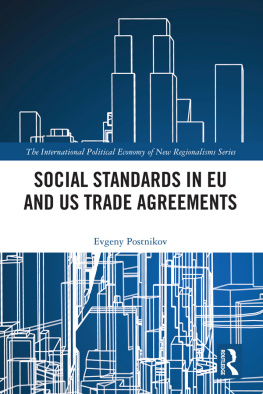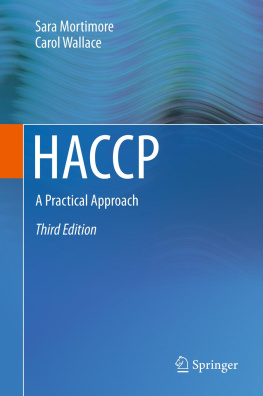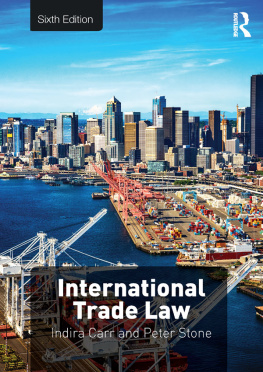First published 2017
by Routledge
2 Park Square, Milton Park, Abingdon, Oxon OX14 4RN
and by Routledge
711 Third Avenue, New York, NY 10017
Routledge is an imprint of the Taylor & Francis Group, an informa business
2017 Onsando Osiemo
The right of Onsando Osiemo to be identified as author of this work has been asserted by him in accordance with sections 77 and 78 of the Copyright, Designs and Patents Act 1988.
All rights reserved. No part of this book may be reprinted or reproduced or utilised in any form or by any electronic, mechanical, or other means, now known or hereafter invented, including photocopying and recording, or in any information storage or retrieval system, without permission in writing from the publishers.
Trademark notice : Product or corporate names may be trademarks or registered trademarks, and are used only for identification and explanation without intent to infringe.
British Library Cataloguing in Publication Data
A catalogue record for this book is available from the British Library
Library of Congress Cataloging-in-Publication Data
Names: Osiemo, Onsando, author.
Title: Food safety standards in international trade : the case of the EU
and the COMESA / Onsando Osiemo.
Description: Abingdon, Oxon ; New York, NY : Routledge, 2016. |
Includes index. | Based on authors thesis (doctoral - Universiteit van
Amsterdam, 2012) issued under title: Harmonization of sanitary and
phytosanitary standards in international trade : the case of the EU
and the COMESA.
Identifiers: LCCN 2016013505 (print) | LCCN 2016014012 (ebook) |
ISBN 9781138694125 (hbk) | ISBN 9781315526614 (e-book) |
ISBN 9781315526607 (Web PDF) | ISBN 9781315526591 (ePub) |
ISBN 9781315526584 (Mobipocket)
Subjects: LCSH: Food law and legislation. | Foreign trade regulation. |
Food law and legislationEuropean Union countries. | Food law and
legislationAfrica. | Non-tariff trade barriersLaw and legislation
European Union countries. | European Union countriesForeign
economic relationsAfrica. | AfricaForeign economic relations
European Union countries. | European Union. | Common Market for
Eastern and Southern Africa. | Agreement on the Application of
Sanitary and Phytosanitary Measures (1995 January 1)
Classification: LCC K3626 .O839 2016 (print) | LCC K3626 (ebook) |
DDC 344.04/232dc23
LC record available at https://lccn.loc.gov/2016013505
ISBN: 978-1-13-869412-5 (hbk)
ISBN: 978-1-31-552661-4 (ebk)
Typeset in Galliard
by Apex CoVantage, LLC
The author deftly exposes current problems with safety standards in food exports from Africa to Europe from a legal perspective, with sensitivity and insight. This book delivers original solutions to these important social challenges and is an invaluable resource for African and European policy makers, academics and the socially concerned.
Dr Kamala Dawar, University of Sussex, UK
Dr Osiemo has delivered an important and timely study of the comparable impacts of food safety standards in the context of regional trade arrangements: of particular note is his contribution to the debate about such standards in the context of Southern and Eastern Africa.
Professor Mary Footer, University of Nottingham, School of Law, UK
Contents
I am greatly indebted to professors P J Kuijper and J H Mathis of the University of Amsterdam faculty of law for their support and input in writing this book.
I am most grateful to Alison Kirk, Routledges Senior Commissioning Editor, for her support in bringing the book to life. My gratitude is also extended to the editor and anonymous reviewers of the book.
Food Safety Standards in International Trade
Food safety has become a major concern for consumers in the developed world and Europe in particular. This has been highlighted by the recent spate of food scares ranging from the BSE (mad cow) crisis to Chinese melamine contamination of baby formula. To ensure food safety throughout Europe, stringent food safety standards have been put in place from farm to fork. At the same time, poor African countries in the COMESA rely on their food exports to the European market to achieve their development goals yet have difficulty meeting the EU food safety standards. This book examines the impact of EU food safety standards on food imports from COMESA countries. It also critically examines both EU and COMESA food safety standards in light of the WTO SPS Agreement and the jurisprudence of the WTO panels and Appellate Body. The book makes ground-breaking proposals on how the standards divide between the EU and the COMESA can be bridged and discusses the impact of EU food safety standards on food imports from poor African countries.
Onsando Osiemo is a legal practitioner and researcher in Nairobi, Kenya. He obtained his PhD in law from the University of Amsterdam. His areas of research are in international trade law and regional integration in Europe and Africa.
4
Case studies in food safety standards in EUCOMESA trade
Consumer concerns in rich countries, increased technological detection capacity and so on, have created SPS standards that are now major barriers to African exports. It is not unwillingness to meet these standards that is the problem, nor disagreement with their rationale. The problem is that poor countries in Africa are not equipped to meet these demands.
One of the biggest challenges faced by ACP farmers is the need to comply with not only the EUs non-negotiable standards but also with private standards which come on top of already high standards.
The central issue in EUCOMESA trade is how to enable COMESA exports to the EU without lowering the EU non-negotiable high food safety standards. The EU is the biggest trading partner of COMESA.
However, there are no preferences for food safety standards, since these are qualitative and not quantitative.
The main fruit exports to the EU are grapes, citrus fruit, apples and pears, bananas, pineapples, avocados, mangoes, papayas, and passion fruit; the most important vegetable exports are beans, peas, baby corn, mixed vegetables, and onions.
Having so far examined both the EUs and COMESAs food control systems in stringency of the EU regulations may negatively impact COMESA exports to the EU because of the weak SPS capacities within COMESA.
The examination proceeds by way of case studies of the EU regulations and their impact on COMESA countries exports in horticulture, fish, and beef. The chapter starts with a caveat: the impact of food safety standards on trade is controversial. Hence, any perceived impact that the stringent EU food safety standards might have on the EUCOMESA trade is debatable as to whether its impact on food trade is positive or negative.
The chapter begins, in part two, with an examination of the conundrum posed by food safety standards: Are food safety standards a positive or negative force on international trade, and more particularly, on developing countries exports? Part three goes on to examine specific COMESA trade concerns with EU food safety regulations in beef, fishery, and horticultural products. Part four examines the role and impact of private voluntary standards (PVS) in the EUCOMESA trade. The chapter concludes in part five with a discussion and the conclusions to be drawn from the chapter discussions.
Although it is generally accepted that food safety standards do impact international trade in food products, the economic impact of individual standards, how they compare with other trade distorting measures, and their net effects are controversial. According to Jaffee and Henson:








